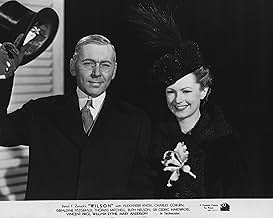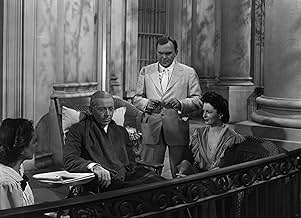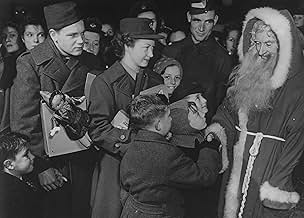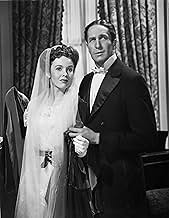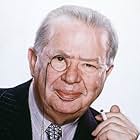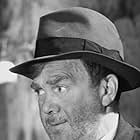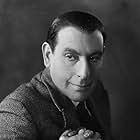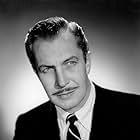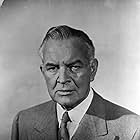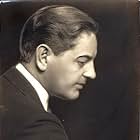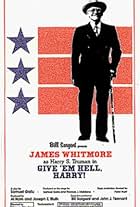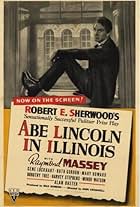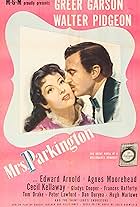PUNTUACIÓN EN IMDb
6,3/10
1,8 mil
TU PUNTUACIÓN
Añade un argumento en tu idiomaA chronicle of the political career of US President Woodrow Wilson.A chronicle of the political career of US President Woodrow Wilson.A chronicle of the political career of US President Woodrow Wilson.
- Dirección
- Guión
- Reparto principal
- Ganó 5 premios Óscar
- 9 premios y 7 nominaciones en total
Cedric Hardwicke
- Senator Henry Cabot Lodge
- (as Sir Cedric Hardwicke)
Reseñas destacadas
This is a film I've wanted to see for a long time since it was nominated for best picture and won a bunch of Oscars in 1944 (in what may be considered one of the weakest years for the Oscar with "Going My Way" winning best film (over the great "Double Indemnity") and Bing Crosby winning best actor). Worldwide as well this was not a great year, as I could only find "A Canterbury Tale", "Ivan the Terrible" and "Henry the V" as memorable films made that year (you could add "Laura" and a couple of Preston Sturges comedies. Blame it on the war). I was also interested in watching a color film made in 1944 in order to compare it with the great British color films made at that time. All in all, the cinematography was very good but the film was dull as hell, I suppose because Wilson was boring as hell and was interpreted by Alexander Knox who gave a performance boring as hell. I heard Henry Fonda was considered for the part and that would have certainly helped the quality of the film and its box office, which was terrible. Regarding historical accuracy, I leave that to others who have studied the matter.
Let us be certain of one thing: Thomas Woodrow Wilson (1856 - 1924), Academician, Historian, Orator, President of Princeton University, Governor of New Jersey, and 28th President of the United States is a very important political figure in American History. He is usually credited to be one of the top ten great Presidents of our history, but these lists of historians are prone to change when new research shows previous ideas were wrong or too hagiographic towards the former President. In Wilson's case historians of his period are confronted with the problem that he had a great contemporary rival, the 26th President Colonel Theodore Roosevelt. Both men at their best were terrific figures, who accomplished a great deal of positive social legislation (they and Robert LaFollette dominate this period: the Progressive Era), and both (with Roosevelt's predecessor William McKinley) made America a great power. But T.R. and W.W. were both great egotists, and had defects in personality and views that make their achievements questionable. T.R. loved the strenuous life, but he also loved war too much - to the point that his youngest son got sacrificed in France in the First World War. Wilson helped get the Clayton Anti-Trust Act and the Federal Reserve set up, but he was a Southerner who backed Jim Crow Laws. He did try to keep America out of World War I (as a boy he lived in Virginia and South Carolina during the Civil War, and saw Columbia, South Carolina destroyed - probably by Sherman's men). But he was willing to use our troops to "straighten out" Latin American countries: Mexico (twice), Haiti, the Dominican Republic. His creation of the first international peace organization, the League of Nations, was great, but flawed due to the U.S. not becoming a member - a flaw that Wilson's egotistic fight with Senator Henry Cabot Lodge over accepting the Treaty of Versailles guaranteed.
This film was made in 1944 by Zanuck, a Democrat. It emphasized Wilson as the far-sighted peace seeker, the forerunner of FDR (who was planning the United Nations). FDR actually was in Wilson's administration (he was Assistant Secretary of the Navy, like his cousin TR had been in 1897 under McKinley). The audience of the time would have been aware of this. As most of the audience would be white, Protestant, and of anglo-saxon background, it would be assumed that the film would be well received. Actually it wasn't. In the midwest, with the heavy connections to Germany or Middle-Europe, and in Irish-American centers (Wilson was cool towards Irish nationalism)the audiences recalled the unpleasant intransigence and pig-headedness of the President. Zanuck had the film opened in his home town in Nebraska, only to find that few were interested in the premier of the film - they told him they had not liked Wilson while he was in office.
As it is the film is excellent in terms of production and cast, starting with Alexander Knox as the President. His is a great performance, which merited his Oscar nomination. But the film is only positive about Wilson (and correspondingly unfair to Lodge, who may have had doubts about the Treaty of Versailles, but was not conspiring to destroy Wilson - he only had to let Wilson do himself in!). As for the racist side of Wilson, to get a glimpse of it see THE GREAT WHITE HOPE, where the Wilson administration is determined to drive the black heavyweight champion (based on Jack Johnson, and played by James Earl Jones) out of the title he deserves to keep.
This film was made in 1944 by Zanuck, a Democrat. It emphasized Wilson as the far-sighted peace seeker, the forerunner of FDR (who was planning the United Nations). FDR actually was in Wilson's administration (he was Assistant Secretary of the Navy, like his cousin TR had been in 1897 under McKinley). The audience of the time would have been aware of this. As most of the audience would be white, Protestant, and of anglo-saxon background, it would be assumed that the film would be well received. Actually it wasn't. In the midwest, with the heavy connections to Germany or Middle-Europe, and in Irish-American centers (Wilson was cool towards Irish nationalism)the audiences recalled the unpleasant intransigence and pig-headedness of the President. Zanuck had the film opened in his home town in Nebraska, only to find that few were interested in the premier of the film - they told him they had not liked Wilson while he was in office.
As it is the film is excellent in terms of production and cast, starting with Alexander Knox as the President. His is a great performance, which merited his Oscar nomination. But the film is only positive about Wilson (and correspondingly unfair to Lodge, who may have had doubts about the Treaty of Versailles, but was not conspiring to destroy Wilson - he only had to let Wilson do himself in!). As for the racist side of Wilson, to get a glimpse of it see THE GREAT WHITE HOPE, where the Wilson administration is determined to drive the black heavyweight champion (based on Jack Johnson, and played by James Earl Jones) out of the title he deserves to keep.
I agree with many of the comments posted here. I, too, was pleasantly surprised by this film. You always read what a box-office disaster the movie was, and you get the idea that it was a real turkey. On the contrary, I think it was a very well-made film. As many others have pointed out, it whitewashes some of Wilson's biography, and omits inconvenient truths about him, (such as some of his racial views and actions). It does point out his stubbornness in relation to the Treaty of Versailles and the League of Nations, though, and his reluctance to compromise on those things. So it isn't a total revisionist biography. It does outline the major events of his political career, and fairly accurately, I think. One thing that really strikes me on watching this film, is how well it captures the complexities of the American Presidency, and the hysteria that the public, and other politicians, often direct towards the president. I think many people, in any historical age, tend to think their generation is the first to experience certain kinds of events, such as war, depression, or political controversy. As we all know, these are timeless events, and though the particulars may change, the reactions to them don't change so much. As for politics, there are some wonderful scenes in the film of the Democratic Conventions of 1912 and 1916, that detail the serious issues, as well as the hoopla and occasional nonsense that has always marked those events. Marching bands, rural banjo players, pretty girls, etc., etc. And it also accurately details the hysterical attacks made against President Wilson- that he was weak, a waffler, a man out of his league, or a warmonger, even a traitor- comments that somehow bring to mind the outrageous things said about more recent presidents. As well as about everyone from Jefferson to Lincoln. It kind of puts it into perspective. People always say how uncivil our politics are now, which is true, but was it really different then?
I'm also very impressed by Alexander Knox's performance, in which he really captures Wilson's character. Much as I love Bing Crosby, I think Knox should have won the Best Actor Oscar for that year. He is so convincing, and almost channels the President. Again, this IS a prettied-up picture of him, but I think it gets many of the essentials right. And, when compared to the paranoia in films like the Oliver Stone presidential biographies of Kennedy, Nixon, and Bush, I think this movie comes pretty close to the way it actually was. It is Movie History, but it seems to follow events fairly accurately. And it gives you a good feel about what it must have been like to be in the center of the storm.
I think the film also recreates the period very well. The costumes seem accurate, the sets are realistic, the Technicolor photography is beautiful, and the contemporary music evokes the atmosphere of that time. The genuine newsreels add a lot of authenticity, too. I think the explanations for how the U.S. got into World War I are also pretty accurate, and detail what a moral struggle it was for Wilson to go to war. And, in the film, Wilson mentions the various conspiracy theories about the reasons for that war that have been in circulation since that time. Again, that reminds a person of the different conspiracy theories that swirl about our time, too.
Anyway, I think this is a better film than it's given credit for. I think it is similar to the various mini-series made about Lincoln, Kennedy, and other presidents, in the TV age. It may not be complete history, but it's a good starting point for anyone interested in Wilson.
Footnotes: character actor Dwight Frye, who is so beloved for his acting in "Dracula," "Frankenstein," and many other classic movies, was slated for the part of Newton D. Baker, Wilson's Secretary of War, in the film. As all Frye fans know, shortly before filming started, Frye tragically died of a heart attack, while riding on a bus. It's a shame, as the part might have turned his faltering career, and life, around.
Also, in the scenes on board the train, just before Wilson has his stroke, you can see cars outside the window. It is supposed to be 1919 or 1920, but some of the cars look very contemporary- 1930s or 1940s cars. A goof, and very easy to see. But I don't think it really detracts from the movie in any serious way.
I'm also very impressed by Alexander Knox's performance, in which he really captures Wilson's character. Much as I love Bing Crosby, I think Knox should have won the Best Actor Oscar for that year. He is so convincing, and almost channels the President. Again, this IS a prettied-up picture of him, but I think it gets many of the essentials right. And, when compared to the paranoia in films like the Oliver Stone presidential biographies of Kennedy, Nixon, and Bush, I think this movie comes pretty close to the way it actually was. It is Movie History, but it seems to follow events fairly accurately. And it gives you a good feel about what it must have been like to be in the center of the storm.
I think the film also recreates the period very well. The costumes seem accurate, the sets are realistic, the Technicolor photography is beautiful, and the contemporary music evokes the atmosphere of that time. The genuine newsreels add a lot of authenticity, too. I think the explanations for how the U.S. got into World War I are also pretty accurate, and detail what a moral struggle it was for Wilson to go to war. And, in the film, Wilson mentions the various conspiracy theories about the reasons for that war that have been in circulation since that time. Again, that reminds a person of the different conspiracy theories that swirl about our time, too.
Anyway, I think this is a better film than it's given credit for. I think it is similar to the various mini-series made about Lincoln, Kennedy, and other presidents, in the TV age. It may not be complete history, but it's a good starting point for anyone interested in Wilson.
Footnotes: character actor Dwight Frye, who is so beloved for his acting in "Dracula," "Frankenstein," and many other classic movies, was slated for the part of Newton D. Baker, Wilson's Secretary of War, in the film. As all Frye fans know, shortly before filming started, Frye tragically died of a heart attack, while riding on a bus. It's a shame, as the part might have turned his faltering career, and life, around.
Also, in the scenes on board the train, just before Wilson has his stroke, you can see cars outside the window. It is supposed to be 1919 or 1920, but some of the cars look very contemporary- 1930s or 1940s cars. A goof, and very easy to see. But I don't think it really detracts from the movie in any serious way.
I don't know how many modern-day film viewers would sit through this long a biography (154 minutes) of a fairly boring man but it moves pretty well and is generally entertaining account of our 28th U.S. President, Woodrow Wilson.
When I watched this, I was unfamiliar with the lead actor, Alexander Knox, and I still am! However, he did a fine job as Wilson. The supporting cast did have some "names," such as Charles Coburn, Thomas Mitchell, Geraldine Fitzgerald, Cedric Hardwicke, Vincent Price, Ruth Nelson and much more.
When they made Technicolor films of the 1940s, which wasn't often, they were very pretty and this one is, too. They also did a nice job re-creating the early 20th century.
It's a nice film but nothing memorable, to be honest, and certainly biased in favor of Wilson....but still worth seeing. With it's length, one viewing would be enough.
When I watched this, I was unfamiliar with the lead actor, Alexander Knox, and I still am! However, he did a fine job as Wilson. The supporting cast did have some "names," such as Charles Coburn, Thomas Mitchell, Geraldine Fitzgerald, Cedric Hardwicke, Vincent Price, Ruth Nelson and much more.
When they made Technicolor films of the 1940s, which wasn't often, they were very pretty and this one is, too. They also did a nice job re-creating the early 20th century.
It's a nice film but nothing memorable, to be honest, and certainly biased in favor of Wilson....but still worth seeing. With it's length, one viewing would be enough.
If you want to dramatize Wilson's life, you can either approach it as either a tragedy or a hagiography, and Fox chose the hagiographic route. Considering the era and that the only biography at the time was the uncritical one by Ray Standard Baker, this is hardly surprising. Thank God, however, they cast the unknown Alexander Knox rather than an established star such as Gary Cooper for the title character; when you see the film you can't imagine anyone else playing the part.
This movie proves that the Hollywood era could do films with some integrity beyond the standard fare from MGM or Warners. Twentieth-Century Fox's Zanuck was the only mogul who had the guts to make a motion picture as expensive as this, with an unknown in the lead, and on a President who, unlike say Teddy Roosevelt, strikes many people as a cold fish. I love this film, despite its simplifying of history and its wartime propaganda because it's very special in many ways. There are plenty of movies like JEFFERSON IN PARIS or YOUNG MR. LINCOLN or ABE LINCOLN IN ILLINOIS or THE PRESIDENT'S LADY etc., but aside from NIXON, Zanuck and King's WILSON seems the only theatrical film that dramatizes a President's life while he served in office. For those of you who find it undramatic, think again: it's a film to cherish
This movie proves that the Hollywood era could do films with some integrity beyond the standard fare from MGM or Warners. Twentieth-Century Fox's Zanuck was the only mogul who had the guts to make a motion picture as expensive as this, with an unknown in the lead, and on a President who, unlike say Teddy Roosevelt, strikes many people as a cold fish. I love this film, despite its simplifying of history and its wartime propaganda because it's very special in many ways. There are plenty of movies like JEFFERSON IN PARIS or YOUNG MR. LINCOLN or ABE LINCOLN IN ILLINOIS or THE PRESIDENT'S LADY etc., but aside from NIXON, Zanuck and King's WILSON seems the only theatrical film that dramatizes a President's life while he served in office. For those of you who find it undramatic, think again: it's a film to cherish
¿Sabías que...?
- CuriosidadesFranklin D. Roosevelt screened the film at the Second Quebec Conference in 1944. Among those watching were Winston Churchill who was decidedly unimpressed and left early to go to bed. For his part, Roosevelt, upon seeing the part with Wilson suffering a stroke while advocating for the League of Nations, remarked, "by God, that's not going to happen to me!"
- PifiasAs the Wilsons tour the White House on their first day, they stop to admire the official portrait of President Taft. As Taft had left office only that day, no official portrait of him would as yet have been painted or hung.
- Citas
Professor Henry Holmes: Now I know why the Democratic Party chose a jackass for a mascot.
- Créditos adicionalesThe 20th Century Fox logo appears without the usual fanfare.
- ConexionesFeatured in History Brought to Life (1950)
Selecciones populares
Inicia sesión para calificar y añadir a tu lista para recibir recomendaciones personalizadas
- How long is Wilson?Con tecnología de Alexa
Detalles
- Fecha de lanzamiento
- País de origen
- Idioma
- Títulos en diferentes países
- Darryl F. Zanuck's Wilson
- Localizaciones del rodaje
- Empresa productora
- Ver más compañías en los créditos en IMDbPro
Taquilla
- Presupuesto
- 4.000.000 US$ (estimación)
- Duración2 horas 34 minutos
- Color
- Relación de aspecto
- 1.37 : 1
Contribuir a esta página
Sugerir un cambio o añadir el contenido que falta


